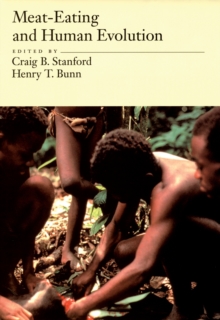
Meat-Eating and Human Evolution Hardback
by Craig B. (Associate Professor, Department of Antropology, Associate Professor, Department Stanford, Henry T. (Professor and Chairman Department of Antropology, Professor and Chairman Department Bunn
Part of the Human Evolution Series series
Hardback
Description
When, why, and how early humans began to eat meat are three of the most fundamental unresolved questions in the study of human origins.
Before 2.5 million years ago the presence and importance of meat in the hominid diet is unkown.
After stone tools appear in the fossil record it seems clear that meat was eaten in increasing quantities, but whether it was obtained through hunting or scavenging remains a topic of intense debate.
This book takes a novel and strongly interdisciplinary approach to the role of meat in the early hominid diet, inviting well-known researchers who study the human fossil record, modern hunter-gatherers, and nonhuman primates to contribute chapters to a volume that integrates these three perspectives.
Stanford's research has been on the ecology of hunting by wild chimpanzees.
Bunn is an archaeologist who has worked on both the fossil record and modern foraging people.
This will be a reconsideration of the role of hunting, scavening, and the uses of meat in light of recent data and modern evolutionary theory.
There is currently no other book, nor has there ever been, that occupies the niche this book will create for itself.
Information
-
Out of stock
- Format:Hardback
- Pages:432 pages, 5 halftones, 67 line illustrations
- Publisher:Oxford University Press Inc
- Publication Date:05/07/2001
- Category:
- ISBN:9780195131390
Information
-
Out of stock
- Format:Hardback
- Pages:432 pages, 5 halftones, 67 line illustrations
- Publisher:Oxford University Press Inc
- Publication Date:05/07/2001
- Category:
- ISBN:9780195131390










